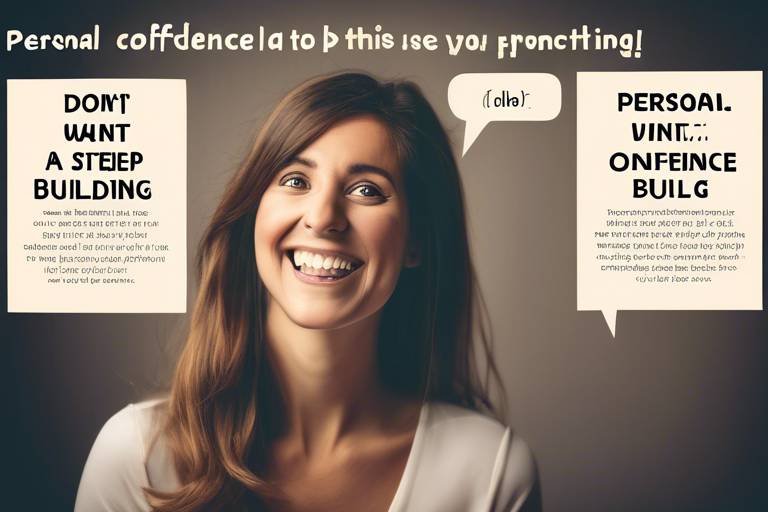Tricks to Boost Confidence Before an Interview
This article explores effective strategies to enhance self-assurance prior to interviews, empowering candidates to present their best selves and increase their chances of success in the competitive job market. In today’s fast-paced world, the pressure to perform well in interviews can feel overwhelming. But don't worry! With the right tricks up your sleeve, you can transform that anxiety into confidence. Let’s dive into some practical tips that will not only prepare you for the interview but also help you walk in with your head held high!
Thorough preparation is key to building confidence. Imagine walking into an interview room, feeling like you own the place. That's the power of preparation! Start by researching the company you’re interviewing with. Understand their mission, values, and recent achievements. This knowledge not only equips you to answer questions but also allows you to ask insightful questions, showing your genuine interest. Next, delve into the job role. What skills are required? What challenges might you face? By understanding these aspects, you can tailor your responses to showcase your suitability.
Another effective method is practicing common interview questions. Think of it as rehearsing for a play. The more you practice, the more natural it will feel. You can even create a list of potential questions and answers. This exercise will help you articulate your thoughts clearly and reduce the chances of being caught off guard. Remember, familiarity breeds confidence!
Non-verbal communication plays a crucial role in interviews. Your body language can speak volumes even before you say a word. To convey confidence, focus on your posture and presence. Stand tall, keep your shoulders back, and avoid crossing your arms. This open posture not only makes you appear more approachable but also boosts your own confidence. Think of it like a superhero stance—when you stand strong, you feel strong!
Maintaining good posture can significantly impact your confidence level. Picture yourself in an interview; your posture should reflect the confidence you want to project. By standing or sitting up straight, you signal to both yourself and your interviewer that you are engaged and self-assured. Additionally, practice moving around a bit if you can. A slight shift in your position can help you feel more dynamic and less static, which can alleviate some interview jitters.
Establishing eye contact is essential for building rapport. When you maintain appropriate eye contact, it shows that you are listening and engaged. It’s like a connection that says, “I’m here, and I care about this conversation.” However, be careful not to stare; instead, aim for a comfortable level of eye contact that feels natural. This balance can help you create a positive interaction with your interviewer.
Using appropriate gestures can reinforce your message. Think of your hands as tools to emphasize your points. When you talk about your achievements or skills, let your hands move naturally to illustrate your enthusiasm. This can make your words come alive! Additionally, pay attention to your facial expressions. A warm smile can go a long way in making both you and your interviewer feel at ease. Remember, enthusiasm is contagious!
Engaging in mock interviews can alleviate anxiety. Practicing with friends or mentors can be incredibly beneficial. Not only does it simulate a real interview scenario, but it also provides you with constructive feedback. Think of it as a dress rehearsal for the big show. The more you practice, the more confident you’ll feel when it’s time for the real deal. Plus, you can fine-tune your answers and body language based on the feedback you receive.
Using positive affirmations can shift your mindset. Words have power, and repeating affirmations can help instill a sense of confidence. Start your day by looking in the mirror and telling yourself, “I am capable,” or “I am prepared for this interview.” These simple phrases can create a positive mindset that carries you through the day. When you believe in yourself, it shows!
Visualizing success can enhance performance. Take a moment to close your eyes and imagine yourself walking into the interview room, confidently shaking hands with the interviewer, and answering questions effortlessly. This mental rehearsal can help reduce anxiety and increase your chances of success. Visualization is like a mental dress rehearsal that prepares you for the spotlight!
Managing stress is vital for confidence. Techniques such as deep breathing and mindfulness can help you stay calm and focused before your interview. When you start to feel anxious, take a moment to breathe deeply. Inhale through your nose for four counts, hold for four, and exhale through your mouth for four. This simple exercise can ground you and bring your focus back to the present moment.
Effective time management reduces last-minute stress. Schedule your preparation time wisely. Break down your tasks into manageable chunks and set specific goals for each day leading up to the interview. This way, you won’t find yourself scrambling at the last minute. Think of it as preparing for a marathon; gradual training leads to better performance on race day!
- What should I wear to an interview? - Choose professional attire that makes you feel confident and comfortable.
- How can I calm my nerves before an interview? - Practice deep breathing, visualize success, and remind yourself of your preparation.
- What if I don't know the answer to a question? - It's okay! Take a moment to think, and if needed, ask for clarification or offer your best guess.

Preparation Techniques
When it comes to boosting your confidence before an interview, thorough preparation is your best friend. Imagine stepping into that interview room feeling like a rock star, ready to dazzle your potential employer with your knowledge and skills. To get there, you need to dive deep into research and practice. Start by researching the company you’re interviewing for. Look at their mission statement, recent news, and company culture. Understanding what they value can help you tailor your responses to align with their expectations. It’s like knowing the rules of a game before you play; it gives you a significant advantage.
Next, take a good look at the job role you’re applying for. What are the key responsibilities? What skills are they looking for? This information can usually be found in the job description. Highlight the parts that resonate with your experience and prepare to discuss them. When you can connect your background to the job requirements, you’ll feel more equipped to showcase your qualifications.
Another crucial aspect of preparation is practicing common interview questions. You might be wondering, “What should I focus on?” Well, here are a few typical questions you might encounter:
- Tell me about yourself.
- What are your strengths and weaknesses?
- Why do you want to work here?
- Where do you see yourself in five years?
By rehearsing your answers to these questions, you’ll not only become more familiar with your own story, but you’ll also be able to articulate it with confidence. Consider practicing in front of a mirror or recording yourself. This way, you can observe your body language and refine your delivery. Remember, the goal is to feel comfortable and confident in expressing who you are and what you bring to the table.
Lastly, don’t underestimate the power of mock interviews. Engaging in a simulated interview with a friend or mentor can be incredibly beneficial. They can provide you with constructive feedback and help you identify areas for improvement. It’s like having a practice match before the big game; it prepares you for the real deal and helps ease anxiety. So, gather your friends, set up a mock interview, and watch your confidence soar!

Body Language Tips
When it comes to interviews, your body language can speak volumes, often saying more than your words ever could. It's fascinating how a simple posture adjustment or the way you use your hands can dramatically change the perception of your confidence. Imagine walking into a room with your head held high, shoulders back, and a warm smile on your face. That’s the kind of positive energy you want to project. It’s not just about what you say but how you carry yourself. So, let’s dive into some key body language tips that can help you shine during your interview.
Your posture is one of the first things interviewers notice. Standing or sitting up straight not only makes you appear more confident but also helps you feel that way. Think of your body as a flag—it should wave high and proud! Slouching can give off an impression of insecurity or disinterest, which is the last thing you want. Here are a few techniques to help you project a strong presence:
- Stand Tall: Keep your back straight, shoulders relaxed, and head held high.
- Sit Confidently: When seated, keep your feet flat on the ground and avoid crossing your arms, which can appear defensive.
- Move with Purpose: Whether you’re entering the room or gesturing while speaking, make your movements deliberate and confident.
Establishing eye contact is essential for building rapport. It’s like a bridge connecting you to the interviewer. When you maintain eye contact, it shows that you are engaged and interested in the conversation. However, be careful not to overdo it—staring can be intimidating! Aim for a balance; look into the interviewer’s eyes while also occasionally breaking gaze to avoid making them uncomfortable. Remember, this is about creating a connection, not a staring contest!
Using appropriate gestures can reinforce your message and convey enthusiasm. Think of your hands as tools—when used correctly, they can enhance your storytelling and make your points more impactful. For instance, open hand gestures can express honesty and openness, while pointing can come off as aggressive. Smile genuinely and use facial expressions to reflect the emotions of the conversation. A warm smile can set a positive tone, while a furrowed brow might suggest confusion or concern.
Engaging in mock interviews is a fantastic way to alleviate anxiety and refine your body language. Practicing with friends or mentors allows you to simulate real interview scenarios and receive constructive feedback. Pay attention to how you present yourself during these sessions. Are you slouching? Are your gestures too over-the-top? This practice can help you become more aware of your body language and make necessary adjustments before the actual interview.
Q: How important is body language in an interview?
A: Body language is incredibly important as it can communicate confidence, engagement, and professionalism. It often sets the tone for the interview, sometimes even before you say a word.
Q: Can I improve my body language?
A: Absolutely! With practice and awareness, you can enhance your body language. Consider recording yourself during mock interviews to identify areas for improvement.
Q: What if I get nervous and my body language changes?
A: It's common to feel nervous during interviews. To combat this, practice relaxation techniques and focus on your posture and breathing to maintain a calm demeanor.

Posture and Presence
When it comes to interviews, are not just about standing tall or sitting up straight; they are about conveying an aura of confidence that can influence how interviewers perceive you. Imagine walking into a room with your shoulders back and your head held high. Does that not instantly make you feel more powerful? Good posture can transform your entire presence, making you appear more engaged and assertive, which is crucial in a competitive job market.
Think of your body as a communication tool. Every slight movement, from the way you sit to how you gesture, sends signals to your interviewers. When you maintain an open posture—arms uncrossed and palms visible—you invite connection and show that you are approachable. This openness can create a more positive atmosphere during the interview, making it easier for you to connect with the interviewer.
Moreover, your posture impacts how you feel internally. Studies have shown that adopting a confident posture can actually lead to a boost in self-esteem and a decrease in feelings of anxiety. So, what are some techniques to enhance your posture and presence? Here are a few:
- Stand Tall: When you walk into the interview room, stand tall with your shoulders back. This simple adjustment can make a world of difference.
- Sit with Purpose: Once seated, keep your back straight and your feet flat on the floor. This not only helps you appear more confident but also makes you feel more alert.
- Use Your Space: Don’t be afraid to take up space. Lean slightly forward when engaged in conversation to show interest and enthusiasm.
In essence, your posture is a reflection of your mindset. By consciously adjusting your body language, you can create a feedback loop that reinforces your confidence. Remember, confidence is contagious; when you project it, others are more likely to respond positively to you. So, before your next interview, take a moment to practice these techniques in front of a mirror. Not only will you see the difference, but you will also feel it.
- How can I improve my posture before an interview?
Practice standing and sitting with your back straight, shoulders relaxed, and head held high. Consider doing posture exercises or stretches leading up to the interview. - What if I feel nervous during the interview?
Take a deep breath and remind yourself of your preparation. Adjust your posture to reflect confidence; it can help calm your nerves. - Can body language really affect the outcome of an interview?
Absolutely! Positive body language can create a strong first impression and foster a connection with the interviewer, enhancing your chances of success.

Eye Contact
Establishing during an interview is not just a matter of politeness; it's a powerful tool that can enhance your communication and build rapport with your interviewer. Imagine walking into a room where everyone is engaged, eyes sparkling with interest. That’s the kind of atmosphere you want to create. When you maintain eye contact, you’re not only showing that you’re listening, but you’re also conveying confidence and sincerity. On the flip side, avoiding eye contact can signal insecurity or disinterest, which is the last message you want to send.
So, how do you master the art of eye contact? Here are some key points to consider:
- Balance is Key: While making eye contact is crucial, staring too intensely can be intimidating. Aim for a natural rhythm, holding eye contact for a few seconds before looking away. This creates a comfortable atmosphere for both you and the interviewer.
- Engage with Everyone: If you’re in a panel interview, make sure to shift your gaze among all interviewers. This shows that you value each person’s presence and opinion.
- Practice Active Listening: Use eye contact to demonstrate that you’re engaged in the conversation. Nodding occasionally while maintaining eye contact can reinforce this connection.
Furthermore, if you’re feeling nervous, practice in front of a mirror or with friends. This can help you become comfortable with maintaining eye contact without feeling awkward. Remember, it’s all about creating a connection. When you look someone in the eye, you’re telling them, “I’m here, I’m present, and I care about what you’re saying.”
In summary, mastering eye contact is a simple yet impactful way to boost your confidence during interviews. By practicing and being mindful of your gaze, you can enhance your communication skills and leave a lasting impression on your interviewer.
- Why is eye contact important in an interview? Eye contact conveys confidence, engagement, and sincerity, all of which are essential for making a positive impression.
- How much eye contact should I maintain? Aim for about 50-70% eye contact during a conversation to strike a balance between engaging and intimidating.
- What if I feel uncomfortable making eye contact? Practice with friends or in front of a mirror to build your comfort level. Remember, it’s a skill that can be developed over time.

Gestures and Expressions
When it comes to interviews, your words are only part of the equation. The way you express yourself through gestures and facial expressions plays a pivotal role in how you are perceived by your interviewer. Think of your body as an amplifier for your message; the more you engage with it, the more your confidence will shine through. For instance, using open hand gestures can create a sense of trustworthiness and openness, while crossing your arms may signal defensiveness or discomfort. So, how can you make your gestures work in your favor?
First, let's talk about hand movements. When you speak, try to incorporate natural gestures that emphasize your points. For example, if you’re discussing a previous achievement, using your hands to illustrate the magnitude of your success can make your story more compelling. However, it's essential to avoid overdoing it; too many gestures can become distracting. Aim for a balance that feels natural and enhances your communication.
Next up, your facial expressions are equally important. A genuine smile can be your best ally, making you appear more approachable and enthusiastic. Consider this: have you ever noticed how a simple smile can lighten the mood in a tense situation? That’s the power of facial expressions at work! During the interview, be mindful of your expressions; nodding in agreement while listening shows engagement and understanding, while a furrowed brow might suggest confusion or concern.
To help you remember the key points about effective gestures and expressions, here’s a small table summarizing some do's and don'ts:
| Do's | Don'ts |
|---|---|
| Use open hand gestures | Cross your arms |
| Maintain eye contact | Stare at the floor or ceiling |
| Smile genuinely | Force a smile |
| Use gestures to emphasize points | Overuse gestures |
Incorporating these tips into your interview preparation can significantly enhance your confidence and the impression you leave on your interviewer. Remember, the goal is to create a connection, and your body language is a critical part of that equation. So, practice in front of a mirror or with a friend, and pay attention to how your gestures and expressions can transform your overall presentation.
- How important are gestures in an interview? Gestures are crucial as they communicate confidence and engagement, often conveying more than words alone.
- Can I practice my gestures? Absolutely! Practicing in front of a mirror or recording yourself can help you become more aware of your body language.
- What if I’m nervous and my gestures become awkward? It’s normal to feel nervous. Focus on slow, deliberate gestures to help maintain control and reduce anxiety.
- Should I mimic the interviewer’s gestures? While mirroring can create rapport, be careful not to overdo it. Authenticity is key!

Practice Mock Interviews
Engaging in mock interviews is one of the most effective ways to alleviate anxiety and build confidence before a real interview. Imagine standing in front of a mirror, rehearsing your lines, and perfecting your delivery; that’s essentially what mock interviews allow you to do, but with the added benefit of receiving feedback from others. Practicing with friends, family, or mentors not only simulates the interview environment but also helps you get accustomed to answering questions on the spot. It's like a dress rehearsal for your big performance!
During these practice sessions, it’s crucial to focus on a few key areas that can significantly impact your performance:
- Realistic Questions: Use commonly asked interview questions to prepare. This might include inquiries such as "Tell me about yourself," or "What are your greatest strengths and weaknesses?" The more you practice, the more fluent you’ll become in your responses.
- Constructive Feedback: After each mock interview, ask for feedback. What did you do well? Where can you improve? This feedback is invaluable as it helps you recognize strengths you may not have noticed and pinpoint areas for growth.
- Time Management: Practice answering questions within a set time limit. This will help you manage your time effectively during the actual interview, ensuring you cover all your points without rambling.
Additionally, consider recording your mock interviews. Watching yourself can be quite revealing! You'll notice your body language, your tone of voice, and even your facial expressions. This self-awareness can be a game changer. You can adjust your posture and refine your delivery based on what you see. It’s like having a personal coach right in your living room!
Finally, don’t underestimate the power of enthusiasm. When practicing, try to convey genuine excitement about the role and the company. Enthusiasm is contagious, and it can leave a lasting impression on your interviewers. Remember, every mock interview is a step closer to mastering the art of interviewing, so embrace the process and enjoy it!
Q1: How many mock interviews should I conduct before my actual interview?
A1: Ideally, you should aim for at least three to five mock interviews. This gives you enough practice to refine your answers and increase your comfort level.
Q2: Can I conduct mock interviews alone?
A2: While practicing alone can be helpful, it’s best to have someone else involved. They can provide feedback and simulate the pressure of a real interview situation.
Q3: What if I feel nervous during my mock interviews?
A3: Feeling nervous is completely normal! Use this as an opportunity to practice managing that anxiety. The more you expose yourself to the interview setting, the more comfortable you will become.

Positive Affirmations
Have you ever noticed how a simple phrase can change your entire outlook? are powerful tools that can help shift your mindset from doubt to confidence. When preparing for an interview, incorporating affirmations into your routine can be a game-changer. Instead of letting negative thoughts creep in, you can replace them with empowering statements that remind you of your abilities and potential. Think of affirmations as your mental cheerleaders, always ready to boost your spirits and encourage you to shine!
So, how do you effectively use positive affirmations? It all starts with crafting statements that resonate with you. These should be simple yet impactful. For instance, instead of saying, "I hope I do well," try affirming, "I am well-prepared and capable of excelling in this interview." This subtle shift in language can make a world of difference. By repeating positive affirmations regularly, especially in the days leading up to your interview, you can build a reservoir of self-assurance that you can draw from when the pressure is on.
Here are a few examples of affirmations you might consider:
- I am confident and articulate.
- I have the skills and experience needed for this role.
- I am capable of handling any questions that come my way.
- I bring unique value to the table.
Try saying these affirmations out loud in front of a mirror. It may feel a bit silly at first, but trust me, it works! This practice not only reinforces your belief in these statements but also helps you visualize yourself succeeding. The more you repeat these positive phrases, the more they embed themselves in your subconscious, transforming your self-doubt into self-belief.
Incorporating affirmations into your daily routine can also create a positive feedback loop. When you start believing in your capabilities, your body language and demeanor will naturally reflect that newfound confidence. This change can be noticeable to interviewers, making you appear more engaging and self-assured. Remember, confidence is contagious; when you exude it, others are likely to feel it too!
Ultimately, the goal of using positive affirmations is to create a mental environment where you can thrive. Think of it as nurturing a garden; the more you water and care for your positive thoughts, the more they will flourish, leading to a blossoming self-esteem. So, before you step into that interview room, take a moment to remind yourself of your worth and capabilities. You’ve got this!
Q: How often should I practice positive affirmations?
A: It's beneficial to practice affirmations daily, especially in the days leading up to your interview. The more you repeat them, the more ingrained they become in your mindset.
Q: Can I create my own affirmations?
A: Absolutely! Personalizing your affirmations makes them more effective. Tailor them to reflect your unique strengths and the specific challenges you face.
Q: What if I don’t believe my affirmations at first?
A: That’s completely normal! Start by repeating them anyway. Over time, as you continue to affirm these positive statements, you’ll find that your belief in them grows stronger.
Q: Should I say affirmations out loud or in my head?
A: Saying them out loud can be more powerful, as it engages your senses and reinforces the message. However, you can also repeat them silently if that feels more comfortable for you.

Visualization Techniques
Visualization techniques are a powerful tool that can significantly enhance your confidence before an interview. Imagine stepping into the interview room, feeling calm and collected, with a smile on your face. That’s the essence of visualization! By picturing yourself succeeding, you create a mental blueprint that prepares you for the real thing. This technique is akin to rehearsing a play in your mind; the more you practice, the more natural it becomes.
To effectively use visualization, find a quiet space where you can relax and focus. Close your eyes and take a few deep breaths to center yourself. Then, begin to envision the entire interview process. Picture the moment you walk into the room, greeting your interviewer with confidence. Visualize yourself answering questions with clarity and poise, showcasing your skills and experiences effortlessly. This mental rehearsal not only boosts your confidence but also reduces anxiety, allowing you to perform at your best.
Moreover, it's essential to engage all your senses during this visualization exercise. Imagine the sounds of the interview room, the feel of the chair beneath you, and even the expressions on your interviewer's face. By immersing yourself in this experience, you create a more vivid and impactful mental image. Consider integrating the following steps into your visualization routine:
- Set a Specific Goal: Define what you want to achieve during the interview, whether it's landing the job or impressing the interviewer.
- Visualize Success: Always focus on positive outcomes. Imagine yourself receiving an offer or being praised for your responses.
- Practice Regularly: Make visualization a part of your daily routine, especially leading up to the interview day.
Incorporating these visualization techniques into your preparation can transform your mindset. Instead of viewing the interview as a daunting task, see it as an opportunity to showcase your strengths. Remember, your mind is a powerful ally; when you believe in your success, you're more likely to achieve it. So, embrace visualization, and watch your confidence soar!
Q1: How long should I practice visualization before an interview?
A1: It's beneficial to practice visualization daily, especially in the week leading up to your interview. Even a few minutes each day can make a significant difference.
Q2: Can visualization really improve my interview performance?
A2: Yes! Many successful individuals, including athletes and public speakers, use visualization to enhance their performance. It helps reduce anxiety and boosts confidence.
Q3: What if I struggle to visualize?
A3: If you find it challenging to visualize, try writing down your thoughts and feelings about the interview first. This can help clarify your goals and make visualization easier.

Stress Management Strategies
Managing stress is an essential component of building confidence before an interview. When you’re anxious, your mind can race, and your body can feel tense, making it difficult to present your best self. So, how can you regain control and calm those nerves? One effective way is through deep breathing exercises. By focusing on your breath, you can lower your heart rate and clear your mind. Imagine inhaling deeply through your nose, filling your lungs completely, and then exhaling slowly through your mouth. This simple practice can work wonders and help you feel more centered.
Another powerful technique is mindfulness meditation. Taking just a few minutes each day to practice mindfulness can help you stay grounded and reduce anxiety. Picture yourself sitting in a quiet space, focusing on the present moment, and letting go of distractions. You can even visualize yourself walking into the interview room with confidence and poise. This mental rehearsal can be incredibly effective in reducing pre-interview jitters.
In addition to these techniques, you might want to consider physical activity as a way to manage stress. Engaging in exercise releases endorphins, which are known as the body's natural stress relievers. Whether it’s a brisk walk, a quick jog, or a session at the gym, moving your body can help release built-up tension and boost your mood. Think of it as a way to shake off the nerves, allowing you to step into your interview feeling refreshed and energized.
Effective time management also plays a crucial role in stress reduction. When you plan ahead and allocate enough time for preparation, you’ll feel more in control. Create a timeline for your interview preparation, breaking down tasks into manageable chunks. For example, you could set aside specific days for researching the company, practicing interview questions, and rehearsing your body language. This way, instead of cramming everything last minute, you can approach the interview with a clear mind and a sense of readiness.
To illustrate the importance of time management, here’s a simple table that outlines a potential preparation timeline:
| Day | Activity |
|---|---|
| 1 Week Before | Research the company and role |
| 5 Days Before | Practice common interview questions |
| 3 Days Before | Engage in mock interviews |
| 1 Day Before | Review notes and practice relaxation techniques |
| Day of Interview | Stay calm, breathe deeply, and visualize success |
By incorporating these stress management strategies into your preparation routine, you’ll not only feel more confident but also more capable of handling whatever the interview throws your way. Remember, it’s all about finding what works best for you. So, whether it’s through breathing exercises, mindfulness, physical activity, or effective time management, take the time to prioritize your mental well-being. You’ve got this!
- What are some quick stress relief techniques I can use before an interview? Deep breathing, mindfulness, and light exercise can all help reduce stress quickly.
- How can I practice mindfulness effectively? Start with just a few minutes each day, focusing on your breath and letting go of distractions.
- Is it normal to feel nervous before an interview? Absolutely! Feeling nervous is a common experience, but with the right strategies, you can manage that anxiety.
- How does physical activity help with stress management? Exercise releases endorphins, which improve your mood and help alleviate stress.

Time Management
Effective time management is a game changer when it comes to preparing for an interview. Imagine this: you have an important interview looming, and instead of feeling overwhelmed by the ticking clock, you’re calmly reviewing your notes, practicing your answers, and even squeezing in a little relaxation. Sounds good, right? Well, with the right strategies, this can be your reality! The key is to create a structured plan that allows you to allocate time wisely, ensuring that you cover all the necessary preparation without the last-minute panic.
To kick things off, start by determining how much time you have left before the interview. This will help you create a realistic schedule. Break down your preparation into manageable chunks. For instance, if you have a week, you might want to dedicate specific days to different aspects of your prep:
| Day | Focus Area |
|---|---|
| Day 1 | Research the Company |
| Day 2 | Understand the Job Role |
| Day 3 | Practice Common Interview Questions |
| Day 4 | Mock Interviews |
| Day 5 | Body Language and Presentation |
| Day 6 | Positive Affirmations and Visualization |
| Day 7 | Review and Relax |
This structured approach not only helps you stay organized but also allows you to focus on one thing at a time, reducing the feeling of being overwhelmed. Remember, it’s about quality, not quantity. Spend your time wisely by diving deep into the most important areas rather than skimming the surface of everything.
Moreover, it’s essential to incorporate breaks into your schedule. Just like a marathon runner needs to pace themselves, you too must allow your brain to recharge. Short breaks can actually boost your productivity and help you retain information better. So, don’t hesitate to step away from your study materials for a quick walk or a coffee break!
Finally, consider using tools like calendars or apps that can help you visualize your schedule. Setting reminders for each task can keep you on track and ensure nothing falls through the cracks. By managing your time effectively, you’ll not only enhance your preparation but also walk into that interview room feeling confident and ready to shine.
- How can I manage my time effectively before an interview? Start by creating a structured schedule that breaks down your preparation into manageable tasks. Allocate specific days for research, practice, and relaxation.
- Should I take breaks while preparing for an interview? Absolutely! Incorporating short breaks can help recharge your mind and improve retention of information.
- What tools can help me with time management? Consider using calendars or productivity apps to visualize your schedule and set reminders for each task.
- How important is it to practice mock interviews? Practicing mock interviews is crucial as it helps simulate real interview scenarios, reduces anxiety, and provides constructive feedback.
Frequently Asked Questions
- What are some effective preparation techniques for interviews?
Preparation is essential for boosting your confidence. Start by researching the company thoroughly—know their values, mission, and recent news. Understand the job role you're applying for and practice common interview questions. This helps you feel more equipped and ready to tackle anything that comes your way!
- How important is body language during an interview?
Body language is crucial in interviews! It can convey confidence and engagement. Maintaining good posture, making eye contact, and using appropriate gestures can significantly impact how interviewers perceive you. Think of it as your silent spokesperson, communicating your confidence even before you say a word!
- What are some positive affirmations I can use before an interview?
Positive affirmations can be a game changer! Try repeating phrases like "I am prepared and capable" or "I will succeed in this interview." These simple statements can help shift your mindset and instill a sense of confidence, making you feel more empowered as you walk into that interview room.
- How can visualization techniques help me before an interview?
Visualization is like a mental rehearsal for success! By imagining yourself confidently answering questions and connecting with the interviewers, you can enhance your performance. Picture every detail, from your outfit to the handshake, and you'll feel more prepared and less anxious.
- What stress management strategies can I use before an interview?
Managing stress is vital for maintaining confidence. Techniques like deep breathing, mindfulness, and even light exercise can help calm your nerves. Consider setting aside a few minutes to breathe deeply or meditate before the interview to clear your mind and focus on the task at hand.
- How can I effectively manage my time leading up to an interview?
Time management is key to reducing last-minute stress! Create a schedule that allocates time for research, practice, and relaxation. By ensuring you have ample preparation time, you can minimize anxiety and approach your interview with a clear and focused mind.



















